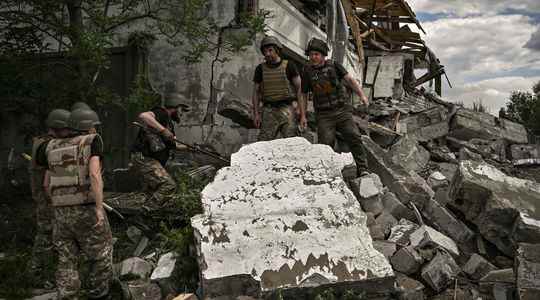Shelling intensifies in northeastern Ukraine. Kharkiv, the country’s second city, which has resisted pressure from Russian forces since the start of the offensive on February 24, is under fire. In the Donetsk region to the east, the intensity of the shelling “is increasing all along the front line”, said the Ukrainian presidency, reporting one dead and seven wounded, including a child. “The front has come closer in recent weeks, up to 15-20 kilometers”, explained to AFP Vadym Lyakh, mayor of Sloviansk, in the oblast of Donetsk, who hopes that “the new weapons which our army has need will come soon”.
Fighting is also raging around the agglomeration of Severodonetsk, an industrial basin in eastern Ukraine partially controlled since 2014 by pro-Russian separatists supported by Moscow and a key area for controlling the whole of Donbass. For their part, the Russians accuse the Ukrainians of having hit three drilling platforms of their gas and oil complex off the Crimea on Monday morning. Russia, however, retains control of this area of the Black Sea. Its blockade has the consequence of preventing the export by freighters millions of tons of cereals of which Ukraine is one of the world’s leading producers.
- Moscow propaganda arrives in the occupied Ukrainian territories
The Russian army announced on Tuesday that it had connected the entire Kherson region to Russian television channels which will now be accessible “free” in this region conquered by Moscow in southern Ukraine. “Specialists from Russian Armed Forces transmission units have connected and reconfigured to broadcast Russian channels the last of seven television transmitters in the Kherson region,” the Russian Defense Ministry said in a statement, adding that an estimated one million people in the region now have access to these channels.
- Kremlin’s first comment on the two captured US soldiers
The two Americans who were captured in Ukraine while fighting with kyiv’s armed forces were “endangering” Russian soldiers and must be “held accountable for these crimes”, Kremlin spokesman Dmitry said on Monday. Peskov, during an interview with the American channel NBC News. “They are mercenaries and they were involved in illegal activities on the territory of Ukraine,” said Dmitry Peskov. “They were involved in shooting and shelling” by Russian soldiers.
This is the first comment from the Kremlin on the case of these two former American soldiers, Alexander Drueke and Andy Huynh, according to NBC. Asked about the nature of the crimes with which they are charged, the Kremlin spokesman admitted that the characteristics of their offenses were not yet known, ensuring however that they were not covered by the Geneva conventions on prisoners of war. The circumstances under which the two former servicemen are being held are unclear. As to whether they face the death penalty, Dmitry Peskov simply said, “It depends on the investigation.”
- $103.5 million for children displaced by war in Ukraine
Dmitry Muratov, Russian editor of the independent investigative newspaper Novaya Gazeta, auctioned off his Nobel Peace Prize medal for $103.5 million on Monday. The amount of the sale, won by telephone by a bidder whose identity has not been revealed, will be donated to the Unicef program dedicated to Ukrainian children displaced by the war.
- READ ALSO >> Alexander Query, journalist at “Independent Kyiv”: “No question of leaving Ukraine!”
Dmitry Muratov, who won the prestigious Nobel Prize in 2021 alongside Filipino journalist Maria Ressa, was one of the founders of the Novaya Gazeta newspaper in 1993 after the fall of the Soviet Union and has directed its publication almost continuously. from. The tri-weekly is best known for its investigations into corruption and human rights abuses in Chechnya, and this year became the latest major newspaper to criticize President Vladimir Putin and his tactics inside and outside the country. Novaya Gazeta announced at the end of March that it would suspend its online and paper publications in Russia until the end of the intervention in Ukraine, in the midst of the Kremlin’s toughening against dissonant voices.
- EU members to discuss Ukraine and Moldova candidacy this week
The 27 countries of the EU are due to discuss this week the possibility of granting Ukraine and Moldova candidate status for entry into the Union, European Council President Charles Michel said on Monday. This proposal, in line with what the European Commission recommends, will be expressed Thursday and Friday in Brussels on the occasion of the summit of European leaders who will have to take this decision unanimously.
- Washington says it is studying a cap on the price of Russian oil
US Treasury Secretary Janet Yellen traveled to Canada on Monday to strategize with local Deputy Prime Minister Chrystia Freeland on how the two countries will continue to tackle the Ukraine crisis, fight the runaway inflation, strengthen global supply chains and secure critical minerals. There has also been talk of further restricting Russia’s oil revenues by capping the price of its crude oil.
“We are talking about price caps or a price exception that would broaden and deepen recent and proposed energy restrictions” imposed by the United States and its allies, “which would lower the price of Russian oil and contract revenues. of Putin while allowing a greater supply of oil to reach the world market,” she explained. A price cap “would prevent collateral effects on low-income and developing countries struggling with high food and energy costs.”
- Energy crisis: the Netherlands announces a return to coal
After Germany and Austria, it’s the turn of the Netherlands lift restrictions on coal-fired power generation as Russia gradually reduces gas flows to Europe. Dutch coal-fired power plants can now “operate at full capacity instead of the maximum of 35%”, in force since January 2022 in the country in order to reduce CO2 emissions, announced the Dutch Minister for the Environment and Energy. Energy Rob Jetten.
